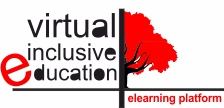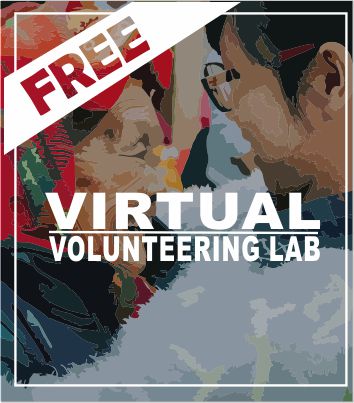VIE: Courses
VIRTUAL INCLUSIVE EDUCATION offers the social sector and its agents multiple courses to promote learning and enhance the development of digital and critical competences, in order to improve not only the quality of the actions and activities of social entities, but also the qualification of their staff and beneficiaries.
These courses have been jointly designed by teachers and experts on the topics they deal with; we are especially proud to have had the support of true beneficiaries to design their contents, achieving a close and accessible style while still addressing the key issues they especially need and find important.
As an example, if you choose the COURSE FOR MIGRANTS AND REFUGEES, you’ll find that expert pedagogues, adult teachers, and associations of migrants and refugees have participated in its creation, which allowed us to develop a highly impactful course to promote the inclusion of newcomers in our society and break down the barriers of hatred and racism.
You can see a detailed description of each course below:
Courses to manage your entity and its projects
Courses to train yourself and your work team
Virtual course for teachers: Inclusive digitalization in school education
This is an e-learning course intended to complement the training of primary and secondary school teachers through an innovative methodology, to integrate students with low vision caused by Albinism or Aniridia.
This course provides teachers with the knowledge and methodologies necessary to adapt their classes to the needs of students with low vision in order to achieve inclusion in the classroom.
Virtual Volunteering Lab
A virtual environment that facilitates the implementation of the methodology “LEARNING BY DOING, LEARNING HELPING”, meaning the collaborative and inclusive learning of adult persons based on digital volunteering; and offering the specific tools that enable a transnational and effective educational experience.
This digital environment provides the teacher, or even an adult person who wants to learn on their own, all the necessary tools to facilitate the implementation of the learning methodology “LEARNING BY DOING, LEARNING HELPING”. In this way, this environment provides the user with a tool to find other students from all over Europe registered on the platform who have a different profile from theirs, facilitating the creation of study couples. It also automatically selects the itinerary most appropriate to the characteristics of the two students, and give activities proposed by partner entities -updated in real time with the specific needs of these entities with specific training content- and all the necessary tools to carry out the virtual work with the partner (chat, help materials, synchronous and asynchronous communication with a tutor…) so the beneficiary adult person does not require to look for other virtual tools or apps, everything they need is in the VIRTUAL VOLUNTEERING LAB.
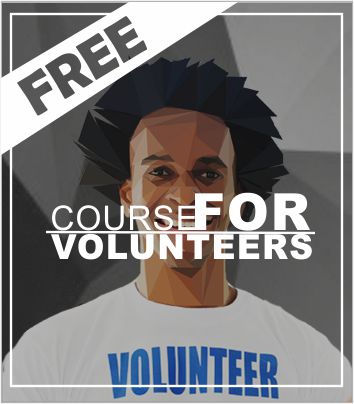
Volunteers Learning
The course that you are going to start is intended to offer volunteers -or those who aspire to become one- the possibility of acquiring, updating, completing, or expanding their specific knowledge and skills to work on social projects for the inclusion of migrants or refugees through formal and non-formal learning. We offer you the possibility of improving your capabilities of helping those who need it the most, and with that reaching a fairer and equal society.
This course gathers contents and methodological strategies created through the experience of migrant persons themselves, and those compiled over the years by social entities expert in the inclusion of segregated or marginalized groups. Through the exchange of experiences and shared effort, we offer you a course that we believe is useful and effective to -regardless of your previous experience- make a difference in migrants’ and their neighbors’ lives. This course will also allow you to reinforce the “COURSE OF LITERACY FOR ADULTS” by continuing the training it proposes with specific contents and examples in the field of volunteering. This course, especially aimed at local adults (native or those who already established in Europe), is a tool capable of advancing in the curriculum defined in European Order ECD/651/2017 of July 5th, which regulates basic education and its curriculum for adults in the field of management of the Ministries of Education, Culture, and Sports (or their counterparts) in European countries.
Thus, the purpose of the course “SPECIFIC TRAINING AND INCLUSION” is to improve your volunteering abilities in social entities, but also to help you develop tools for the critical analysis of your own environment and encourage your direct participation in volunteering as a mechanism to build a more inclusive, diverse, and fair society.
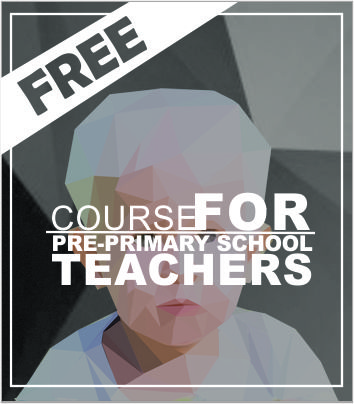
Low Vision in the Pre-primary School
The course that you are going to start aims to provide basic knowledge on visual impairment, to allow you to develop educational procedures appropriate to the pre-primary education stage, within the general framework of inclusion. We want to offer pre-primary school teachers (like you) the possibility of acquiring, updating, completing or expanding their knowledge and skills regarding attention to diversity, especially in the case of visually impaired students, so you can turn the ordinary classroom into inclusive environments, to improve the future personal and professional development of children with visual deficiency.
This course is mainly aimed at teachers of existing pre-primary education schools, however, when we speak of the educational community, we must not forget the environment (family, friends), which is why this course also aims to become a valid tool for anyone who intends to enter, in a didactic, scientific, and systematic way, into the appealing and exciting world of the development and inclusive education of visually impaired children.
This course is based on the conviction that Integrated Education offers more possibilities towards children’s psychosocial development than a segregated one. The goal of this type of education is the inclusion of students with visual impairment, so they are capable of participating and interacting normally with other children without visual disabilities, and also competing in the same productivity and efficiency conditions in the future. Therefore, this course do not focus on early childhood education curricular issues, but it provides essential training to work with students with special needs through an innovative methodology that tries to fully integrate these students along with non-visually impaired students so they develop the social skills and self-confidence that will be paramount for, in the short term, their access to primary education, and for their social and labor inclusion in the future.
Courses to improve your and your beneficiaries’ education
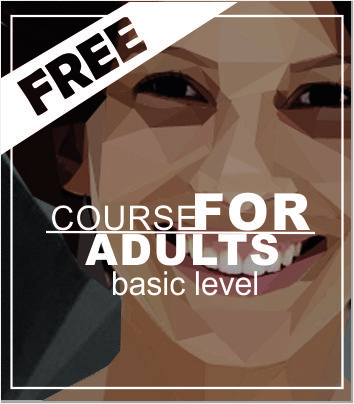
Adults Learning
This course offers its users (persons between 18 and 35 years old) the opportunity of acquiring, updating, completing, or expanding their knowledge and skills for their personal and professional development through both formal and non-formal education. We want to offer you the possibility of developing basic training, and expanding and renewing your knowledge, skills, and abilities permanently.
Thus, the purpose of the course “TRAINING BASIC SKILLS” is to improve your professional qualification and develop your personal skills and participation in social, cultural, political, and economic life. We specifically offer a basic learning compatible with the learning of EPAS and other official adult training centers in Europe which will enable you, once completed, to obtain official adult education certifications. But this course also helps you in developing tools for the critical analysis of your environment, and encourages you to directly participate in volunteering as a mechanism to build a more inclusive, diverse, and fair society.
The course proposes an innovative learning, not focused on memory or isolated facts (like outdated education) but on the development of key competences through a virtual and customized learning that you can carry out from your home or even from your smartphone. The European Parliament (highest body of the European Union) stated in Recommendation 2006/962/EC that these competences are a combination of knowledge, skills, abilities, and attitudes appropriate to the context: this means that we do not only intend you to learn new things, but also learn how to do those things (skills) and how you face them (attitudes).
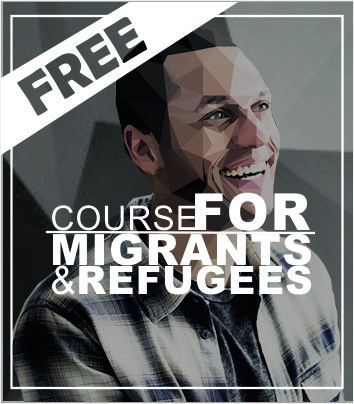
Migrants and Refugees Learning
This course is intended to serve as a guiding tool for migrants who wish to live, work, and settle in a new society, while also providing help and support to professionals from social organizations that work in the reception and counseling tasks for non-EU citizens.
Its content is aimed at people who are under immigration laws, and has been developed thanks to the joint work of volunteers and experts. It explains the duties and rights of both newcomers and the authorities in all areas. In general terms, it aims to contribute to the inclusion of migrants and refugees by including more specific materials on some of areas, but for a more personalized information and advice, we recommend you to contact a legal service and/or a specialized entity.
The contact data of all public entities cited throughout the guide in each area are again specified in the last pages of each of the Didactic Units, plus a brief list of associations that can provide you legal advice, guidance, and other services aimed at newcomers.
One of the more useful objectives of the course “SPECIFIC PROFESSIONAL TRAINING” is to obtain, once completed, a certificate recognized by the entities participating in the project, designed under the European Erasmus Plus Programme. This certificate provides information on different inclusion mechanisms, while also offering resources for the real improvement of the situation of the migrant person.
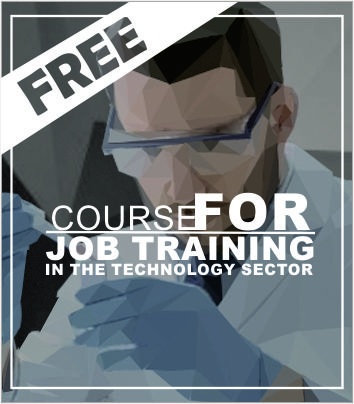
Job Training in the Technology Sector
Through this course we offer you a comprehensive training, starting from basic literacy to the development of the digital and technological skills necessary to access certain jobs in the technology sector; all through an educational itinerary based on scientific thinking and critical analysis.
This course proposes the creation of itineraries adaptable to the initial situation of each user, determining the contents and levels from their previous level of knowledge and skills.
It is aimed at adults between 18 and 30 who left the educational system and have not been able to access the labor market, it isn’t only intended for academic training or improving their basic knowledge, but also to significantly promote their employability, inclusion, and motivation to be active through participation in the fields of technology and innovation.
The course proposes a flexible and adaptable educational methodology, micro e-Learning, a proposal based on virtual learning and on fragmenting the didactic contents by means of which certain skills are acquired. Learning in this way is generated in small pills (cases) that, although autonomous, are interconnected with the rest to form a broader and deeper knowledge in the long term.
We offer a large series of cases that propose plausible situations in your personal, social, or work environment, about which you’ll have to think, look for information, face problems, and make decisions. This learning breaks with the paradigms and approaches of traditional education, it is a learning based on problem solving.
